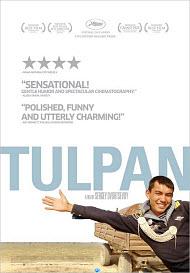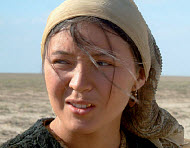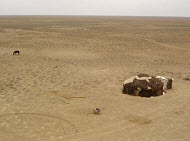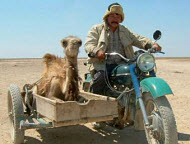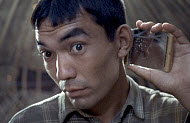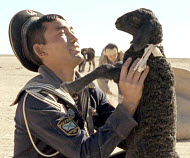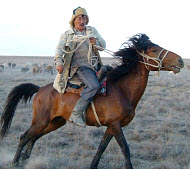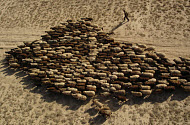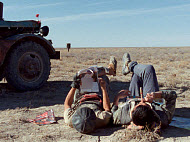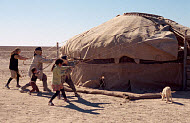Tulpan
Reviewed by: Jim O'Neill
CONTRIBUTOR
| Moral Rating: | Better than Average |
| Moviemaking Quality: |
|
| Primary Audience: | Adults |
| Genre: | Comedy Drama |
| Length: | 1 hr. 40 min. |
| Year of Release: | 2009 |
| USA Release: |
April 1, 2009 |
| Featuring |
|---|
| Tolepbergen Baisakalov, Ondas Besikbasov, Samal Esljamova, Askhat Kuchencherekov, Bereke Turganbayev |
| Director |
|
Sergei Dvortsevoy |
| Producer |
| Pallas Film, Cobra Film AG, Eurasia Film, Filmcontract Ltd., Pandora Films, Karl Baumgartner, Valerie Fischer, Bulat Galimgereyev, Raimond Goebel, Thanassis Karathanos, Gulnara Sarsenova |
| Distributor |
| Zeitgeist Films |
“She’s the only girl for him.”
“Tulpan”, directed by Sergei Dvortsevoy, was made in Kazakhstan. The story takes place in the steppe, an arid, treeless and dust blown region, somewhere in the southern part of the country, far away from urban civilization. “Tulpan” is not escapist entertainment. It moves slowly, sometimes hardly at all. There are scenes when the camera stands still for minutes at a time as characters and farm animals move in and out of the frame. Nothing seems to happen at first; yet over the course of the film, a lot does happen. Dvorestsevoy and co-writer Gennadi Ostrovsky string together a series of seemingly small events, but those common, everyday occurrences resonate with meaning and intensity.
Asa (Askhat Kuchenchekov) lives with his sister and brother-in-law, and their three children, in a tent on the steppe. He has returned from duty with the navy and wants to live the life of a sheep herder. In order to do so he needs a herd of his own. To get that herd he must marry, and since women are as rare as trees in this barren land, his options are limited. The one available young woman is named Tulpan, and Asa tries unsuccessfully to woo her. We never actually see Tulpan because she hides behind a curtain in her parent’s tent when Asa comes to call. The only time Tulpan emerges from the curtain is to run and hide behind a barn door. In one scene Asa tries to show her the inside of the collar of his sailor uniform where he has drawn a series of images that tell the story of his dreams. She is still unmoved. Tulpan may be cool and distant--boy, is she distant!--but she is funny too. So are her deadpan parents. Her only reason for refusing Asa is her dislike for his big ears. The still single Asa continues to search for a niche for himself on the steppe and to overcome the resentment he harbors for his overbearing brother in law. He is frequently tempted by a friend to escape his surroundings and to flee to the nearest city where diversion and excitement await. The friend drives a jalopy that is overflowing with flashy but useless souvenirs of a world promising a heaven on Earth. The jeep’s one radio song is a gospel rock number whose refrain is “By the rivers of Babylon, I will lay down.” Asa must decide whether the life he has dreamed about and feels a calling for is worth the struggle and the suffering, or whether another life will bring him easier and faster rewards.
Asa’s epiphany happens during one of the times he chooses to run away. During his escape he comes upon a lone, deserted sheep, who also happens to be in labor. There is no one Asa can turn to for help; he can continue his retreat or he can deliver the lamb himself. This is his moment to put away childish things and to become what he knows he was meant to become. Alone in the wilderness, he accepts his calling as well as the grace that goes with that calling.
Despite its remote and greenless setting, “Tulpan” teems with life. Asa‘s nephews and niece: a boy toddler who scurries around on a homemade stick horse, a preteen boy who can listen to the radio news and repeat it later verbatim, and a teenage girl who sings songs of lament to relieve her adolescent anxiety are familiar lights in an unfamiliar world. The children are endearing, and not in the precocious in-your-face-much-smarter-than-any parent way most of the TV sitcom kids we see every night are. In this movie, they are a delight because they are indeed children. They are a complement to their parents; not a scourge.
Dvortsevoy doesn’t romanticize or sentimentalize the nomadic way of life. You can almost feel the sting of the wind and the choking grip of the dust. The scenes of sheep giving birth are graphic, and gut-wrenching. Still, there are tender moments. Asa’s sister rolls and counts balls of sheep’s milk cheese that she tucks away in blankets; the little boy runs off after his uncle, but not before rescuing his dust covered pet turtle from the ground; Asa tells Tulpan and her family about his life and death struggle--a tall tale, no doubt, but a good one--with a giant octopus.
The movie is funny, too. It took me awhile to get some of the jokes. A lot of them had to do with animals, camels in particular. There is a great comic scene in which a veterinarian takes to his motorcycle to stay on the run from a stalking, and biting, camel. All the actors give perfect performances, but the animals are marvels of timing and expression.
For a small film the cinematography, the sound, the sound editing, and even the art direction are exemplary. The calm, natural light, the groaning winds, and the threatening dust storm columns, all done without the assistance of a special effects lab, don’t just bring the steppe to life; they elevate the landscape to the level of an actual character in the romantic style of “Wuthering Heights” or “Far From The Madding Crowd”.
Dvortsevoy is a naturalist who finds adventure and beauty in everyday life. France’s Robert Bresson and India’s Sajtyajit Ray are the cinematic masters of this art. Bresson’s “Au Hasard, Balthasar” (another film in which animals play a crucial part) and “Diary of a Country Priest”, and Ray’s “Apu Trilogy” are films that may not excite emotionally, but they do reveal humanity at its most vulnerable, and also at its most courageous. It is in these films that one also gets glimpses of God’s grace at work and insight into how that grace guides the human experience. Right now, Dvortsevoy may not enjoy the stature of Bresson and Ray( Bresson was an agnostic who nonetheless preferred to cast believers in his films and Ray was a Hindu), but I don’t think it’s a stretch to compare “Tulpan” to their work. I hope that Dvortsevoy will make more films about life in Kazakhstan, and that they will be released in the United States. “Tulpan” was considered for a best foreign language film Oscar this year, but was not nominated. The film did win a prize at last year’s Cannes film festival.
“Tulpan” is in Kazak with English subtitles. A few of the translated words are four letter ones. There are some magazine pictures depicting female nuditity. Otherwise, this is a commendable coming of age story about a young man seeking marriage and a purpose.
Violence: Moderate / Profanity: Mild / Sex/Nudity: Mild
See list of Relevant Issues—questions-and-answers.


PLEASE share your observations and insights to be posted here.
